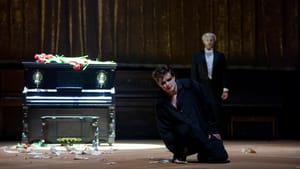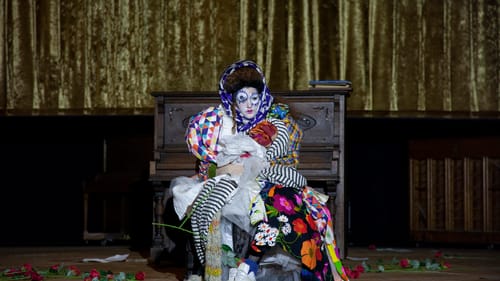Stay in the Loop
BSR publishes on a weekly schedule, with an email newsletter every Wednesday and Thursday morning. There’s no paywall, and subscribing is always free.
Missing the mark among #MeToo
Curtis Opera Theatre and Opera Philadelphia present ‘Don Giovanni’

How should we approach Don Giovanni in 2019? Mozart’s opera contains some of the most thrilling and beautiful music ever written, and Lorenzo Da Ponte’s engaging libretto remains among the best writing in the entire operatic canon. Yet the work also celebrates a toxic, nearly demonic protagonist who rapes and murders for sport—and who often elicits more sympathy from the audience than his victims do. The question of whether to say #TimesUp to this legendary lothario is not merely rhetorical.
I had high hopes for what director R.B. Schlather might bring to the conversation surrounding the opera and its problematic themes with his new staging, a co-production of Curtis Opera Theatre and Opera Philadelphia. The rising star has created some of the most memorable theatrical experiences in my recent memory, including a visionary Pelléas et Mélisande for Curtis in 2017 and a breathtaking version of Virgil Thomson’s rarely performed The Mother of Us All at Hudson Opera House in New York. He shows no fear of wrestling with big questions and taming thorny texts—exactly what a contemporary excavation of this tale of depravity and moral decay needs.
What’s happening here?
In a program note, Schlather writes of “bringing … all the cultural conversations in the media over the last few years about power and abuse” to his conception of the opera. Yet whatever thought process Schlather employed results in a muddled, often incomprehensible production, with few coherent ideas and even fewer good ones. Those unfamiliar with Don Giovanni likely won’t have any idea the opera celebrates a marauding abuser—or, frankly, any idea what’s happening at all.
First things first: What’s with all the upright pianos dotting the Perelman Theater stage? They make for an arresting aesthetic image—set designer Paul Tate DePoo III has a knack for manipulating negative space—but Schlather never connects their presence to any logical mandate in the narrative. Isolated moments work: When the murdered Commendatore drags Giovanni to hell in the opera’s finale, he descends beneath the lid of the piano that represents his tomb. But they largely serve no purpose other than giving the ensemble something to fiddle with during long stretches of recitative, and the pianos’ canted angling often creates unnecessary obstructions.
A disservice to women
The conception of women in the production frequently feels at odds with a radical rethinking of the piece. If you want to imbue Donna Elvira, Giovanni’s scorned but lusting wife, with some additional agency, perhaps avoid portraying her as a cross between a Tim Burton character and a living trash statue. (Schlather is credited with the costumes.) Little is done to mitigate the servant Zerlina, whom Giovanni ravishes on her wedding night. Hers is a character primed for revisionist treatment—she sings an aria imploring her husband to beat her, after all—but Schlather stages her trajectory in a surprisingly conservative manner.

Perhaps the most questionable bit of stage business comes during the famous aria “Madamina, il catalogo é questo,” in which Giovanni’s factotum Leporello recounts his master’s sexual conquests. In describing the various types of women his boss has conquered and assaulted—young and old, blonde and brunette—Leporello here furnishes head shots of legendary opera singers. I doubt Deborah Voigt and the late Montserrat Caballé would appreciate being objectified as la grassotta (the large women Giovanni prefers for his wintertime bed). And in a truly gross moment, the line “Sua passion predominante é la giovan principante” (“His great passion is the young virgin”) comes with a portrait of slain child beauty queen JonBenet Ramsey.
The voices
The production flops, subverting its own good intentions. I wish I could say the musicianship compensates for the missteps, but that too proves a variable proposition. The evening’s best singing and acting comes courtesy of Dennis Chmelensky, an honorable Giovanni in the lyric baritone tradition and a focused, connected stage performer. Soprano Lindsey Reynolds also displays an attractive, feathery tone as Zerlina.
Soprano Tiffany Townsend deploys laser-focused high notes as Donna Anna, but her register breaks sound surprisingly disconnected for a singer so young. She also overuses vibrato to a distracting degree. As Don Ottavio, tenor Aaron Crouch shows off exquisite breath control and a genuine sense of Mozartian line—yet his vocal tone has grown more hooded and less attractive since I first heard him several years ago.
As Donna Elvira, soprano Sophia Hunt largely overcame her silly costuming to deliver a vibrant and musically intelligent performance. Hunt formerly billed herself as a mezzo, and her vocal transition doesn’t seem fully secure yet. Still, she remains an artist to watch.
Bass Adam Kiss acted well as Leporello, though his voice lacks much variation in color and beauty of tone. Still, at least he wasn’t saddled with the ridiculous stage business that befell Charles Buttigieg’s Masetto, whom Schlather dressed like a drag-queen Raggedy Andy.
Not much of a case
The highly touted young conductor Karina Canellakis, who will debut with the Philadelphia Orchestra next season, paced the performance. I can’t say I heard anything revelatory in her approach to this overly familiar music, but it was an honorable effort, with some especially rich textures in the overture. Curtis faculty member Lisa Keller played the harpsichord continuo with style and verve.
Knotty though it may be, I can’t imagine losing Don Giovanni forever. But productions like this don’t make much of a case for the work’s relevance in our modern conversation about power and abuse—or a case for much at all.
What, When, Where
Don Giovanni. By Wolfgang Amadeus Mozart and Lorenzo Da Ponte, directed by R.B. Schlather. Curtis Opera Theatre and Opera Philadelphia. March 7 through 10, 2019, at the Kimmel Center’s Perelman Theater, 300 S. Broad Street, Philadelphia. (215) 732-8400 or operaphila.org.
The Kimmel Center is an ADA-compliant venue. Wheelchair-accessible seats or upholstered, loose chairs are available for purchase online, by calling Patron Services at (215) 893-1999/(215) 893-1999 TTY, or by emailing [email protected].
Sign up for our newsletter
All of the week's new articles, all in one place. Sign up for the free weekly BSR newsletters, and don't miss a conversation.

 Cameron Kelsall
Cameron Kelsall